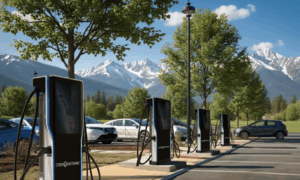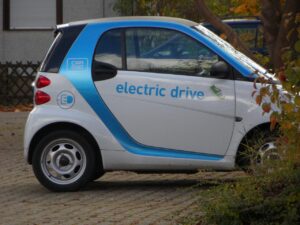
Home / EV Charging News / How Often Should I Fully Charge My EV?
As electric vehicles (EVs) become more mainstream, understanding optimal charging practices is essential for maximizing battery life and performance. One common question EV owners have is how often they should fully charge their vehicles. This article delves into the benefits and drawbacks of full charging, providing insights to help you determine the best charging routine for your EV.
EVs predominantly use lithium-ion batteries, known for their high energy density and efficiency. Key terms related to EV batteries include battery capacity, state of charge (SOC), and depth of discharge (DOD). Battery capacity refers to the total amount of energy a battery can store, usually measured in kilowatt-hours (kWh). The state of charge (SOC) is the current level of battery charge compared to its capacity, expressed as a percentage. Depth of discharge (DOD) represents the percentage of the battery that has been used relative to its total capacity. Understanding these concepts is crucial for developing effective charging habits that balance performance and longevity.
While frequent full charging isn’t always recommended, there are scenarios where it is beneficial. One significant advantage is maximizing range. For long journeys, a full charge ensures maximum range and reduces the need for recharging stops, which is particularly useful for road trips or in areas with limited charging infrastructure. Additionally, having a fully charged battery can be critical in emergencies or unexpected travel situations, providing peace of mind that your vehicle has the necessary range.
Another benefit of full charging is maintaining the accuracy of the battery management system (BMS). The BMS in your EV relies on occasional full charges to recalibrate and maintain accurate readings of battery capacity and range. This recalibration helps the system predict how much distance you can travel before needing to recharge, which is essential for efficient trip planning and avoiding unexpected power depletion.
Despite its benefits, frequent full charging can have drawbacks. One major concern is battery degradation. Regularly charging to 100% can accelerate wear and tear on the battery cells, reducing their overall lifespan. High SOC levels increase the stress on the battery, leading to quicker degradation over time. This is particularly true if the battery remains fully charged for extended periods without being used, as it can exacerbate the wear on the cells.
Heat generation is another issue associated with frequent full charging. Charging a battery to full capacity generates more heat than partial charging, which can contribute to the degradation of the battery cells. Over time, excessive heat can damage the battery, reducing its efficiency and overall lifespan. Modern EVs are equipped with thermal management systems to mitigate these effects, but avoiding unnecessary full charges can further help in preserving battery health.
To optimize both battery health and convenience, many EV manufacturers recommend maintaining a moderate SOC for regular use. For daily commutes and routine driving, charging the battery to around 80% is often sufficient and helps reduce the wear on the battery cells. This practice also aligns with the natural charging patterns of most EV owners, who typically have access to charging facilities at home or work.
For long-distance travel, fully charging the battery before starting the trip is advisable. This ensures you have the maximum range available, reducing the need for frequent charging stops and providing a smoother travel experience. However, it’s essential to balance full charges with regular partial charges to maintain the overall health of the battery. This approach allows you to benefit from the full capacity when needed while minimizing the stress on the battery during everyday use.
Modern EVs come equipped with advanced BMS and thermal management systems designed to optimize charging and discharging cycles. These systems play a crucial role in managing the health and performance of the battery. The BMS monitors the battery’s state, regulates charging rates, and helps prevent overcharging and deep discharging, both of which can be detrimental to battery longevity. Thermal management systems control the temperature of the battery during charging and discharging, reducing the risk of heat-induced degradation.
Recent advancements in battery technology also contribute to better charging practices. Improvements in battery chemistry and design are helping to reduce the negative impacts of high SOC levels and frequent charging. These innovations make modern EV batteries more resilient and capable of handling a variety of charging patterns without significant degradation.
Following the guidelines provided by EV manufacturers is essential for optimal battery care. Most manufacturers offer specific recommendations on charging practices tailored to their battery technology. These guidelines often include advice on how often to fully charge the battery, how to manage partial charges, and how to handle long periods of inactivity. Adhering to these recommendations not only helps maintain battery health but also ensures compliance with warranty terms, providing added protection for your investment.
Manufacturers typically suggest limiting full charges to situations where they are necessary, such as before long trips. For daily use, keeping the SOC within a moderate range is often recommended. This balanced approach helps preserve battery capacity and extends the overall lifespan of the battery, allowing you to enjoy the benefits of your EV for a longer period.
Determining how often to fully charge your EV depends on various factors, including your driving habits, access to charging infrastructure, and long-term battery health considerations. While full charging is beneficial for maximizing range and maintaining BMS accuracy, it can also accelerate battery degradation if done too frequently. By adopting a balanced charging strategy and leveraging modern battery technologies, EV owners can optimize both convenience and battery longevity. Following manufacturer-specific guidelines and using advanced charging features will help ensure that your EV remains efficient and reliable, providing a sustainable and enjoyable driving experience for years to come.



